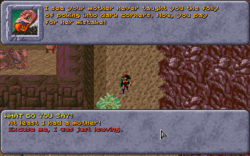RPG Codex Report: Expeditions: Conquistador, Logic Artists and Kickstarter
RPG Codex Report: Expeditions: Conquistador, Logic Artists and Kickstarter
Codex Preview - posted by Grunker on Mon 25 February 2013, 11:26:52
Tags: Expeditions: Conquistador; Logic ArtistsExpeditions: Conquistador is a turn-based RPG with a focus on exploration and strategy. It is being developed by a small Danish development outfit named Logic Artists, and scheduled to be released on Thursday.* I decided to pay them a visit this week, to have a look at their studio, take some pretty pictures and have a chat with the developers. We spoke about the game, about Kickstarter, and about the trials of making an oldschool RPG in the day and age of cover-based shooters.
*EDIT: Since the release of this article, Logic Artists have post-poned the release date of Expeditions: Conquistador due to distribution-issues. See more here. Ah, Thursdays and their RPG releases.
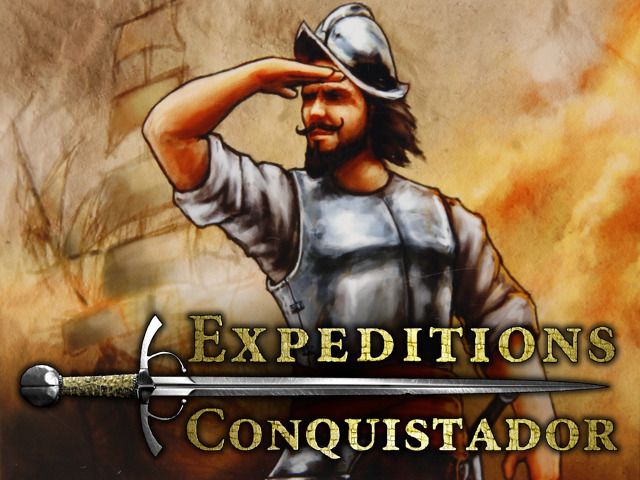
Read the full article: RPG Codex Report: Expeditions: Conquistador, Logic Artists and Kickstarter
*EDIT: Since the release of this article, Logic Artists have post-poned the release date of Expeditions: Conquistador due to distribution-issues. See more here. Ah, Thursdays and their RPG releases.

2013 is looking to be an interesting year, largely because of events that took place in 2012, a year otherwise so uninteresting that finding actual RPGs to discuss was difficult. A year so bland for cRPGs that GameBanshee decided to give its GOTY awards to games like Kingdoms of Amalur and Darksiders II. Yet in the middle of this RPG desert, the Kickstarter phenomenon kicked off in force, and brought us a slew of new games to look forward to. Oddly, it wasn't just Kickstarter that seemed promising – other games catering to the tastes of the Codex were announced separately as well. A game like Chaos Chronicles, promising a blend of Temple of Elemental Evil, Realms of Arkania and Phantasie was suddenly in the mix, with no Kickstarter-backing or anything of that sort, save a few euros from the German state. As such, whether you feel optimistic about the Kickstarter-phenomenon or not, and whether you personally look forward to the games that are a-coming, one thing certainly seems irrefutable: In 2013, the Codex will finally have games to discuss again.
One of the oldschool RPGs funded by Kickstarter is the difficult to define Expeditions: Conquistador, which is coming out soon (February 28th, in fact), and as such looks like it will be delivered on the schedule promised by the developers during the Kickstarter. One of the few Kickstarted games, it seems, to meet its deadline. As one of the first Kickstarted RPGs to actually be released it is of obvious interest to the Codex, and since their studio is located a manageable 20 minutes on foot from my apartment, I decided to pay Logic Artists, the developers of Conquistador, a visit.
One of the oldschool RPGs funded by Kickstarter is the difficult to define Expeditions: Conquistador, which is coming out soon (February 28th, in fact), and as such looks like it will be delivered on the schedule promised by the developers during the Kickstarter. One of the few Kickstarted games, it seems, to meet its deadline. As one of the first Kickstarted RPGs to actually be released it is of obvious interest to the Codex, and since their studio is located a manageable 20 minutes on foot from my apartment, I decided to pay Logic Artists, the developers of Conquistador, a visit.
Read the full article: RPG Codex Report: Expeditions: Conquistador, Logic Artists and Kickstarter
A feature story by Grunker
2013 is looking to be an interesting year, largely because of events that took place in 2012, a year otherwise so uninteresting that finding actual RPGs to discuss was difficult. A year so bland for cRPGs that GameBanshee decided to give its GOTY awards to games like Kingdoms of Amalur and Darksiders II. Yet in the middle of this RPG desert, the Kickstarter phenomenon kicked off in force, and brought us a slew of new games to look forward to. Oddly, it wasn't just Kickstarter that seemed promising – other games catering to the tastes of the Codex were announced separately as well. A game like Chaos Chronicles, promising a blend of Temple of Elemental Evil, Realms of Arkania and Phantasie was suddenly in the mix, with no Kickstarter-backing or anything of that sort, save a few euros from the German state. As such, whether you feel optimistic about the Kickstarter-phenomenon or not, and whether you personally look forward to the games that are a-coming, one thing certainly seems irrefutable: In 2013, the Codex will finally have games to discuss again.
One of the oldschool RPGs funded by Kickstarter is the difficult to define Expeditions: Conquistador, which is coming out soon (February 28th, in fact)*, and as such looks like it will be delivered on the schedule promised by the developers during the Kickstarter. One of the few Kickstarted games, it seems, to meet its deadline. As one of the first Kickstarted RPGs to actually be released it is of obvious interest to the Codex, and since their studio is located a manageable 20 minutes on foot from my apartment, I decided to pay Logic Artists, the developers of Conquistador, a visit.
*EDIT: Since the release of this article, Logic Artists have post-poned the release date of Expeditions: Conquistador due to distribution-issues. See more here. Ah, Thursdays and their RPG releases.

That Conquistador is hard to define is evident the moment you fire up the preview build the guys at Logic Artists were kind enough to offer to us. In my opinion, it can best be described as an odd mix of King's Bounty with more RPG mechanics and a Choose Your Own Adventure game. It is, perhaps, in some way, comparable to Legends of Eisenwald, another kickstarted RPG, though Eisenwald focuses more on strategy elements. Conversely, when I spoke to Lead Designer Jonas Wæver, he said the game's combat was inspired by Fallout and Dungeons & Dragons, while the narrative was inspired by games like Baldur's Gate and Planescape: Torment – though he was reluctant to compare the quality of the writing directly to Torment, a game that was obviously held in high esteem at the offices of Logic Artists. Daniel Eskildsen, Conquistador's Graphics Designer, comments that what really sets Conquistador's battles apart from Kings Bounty or Heroes of Might & Magic is the fact that each battleground is uniquely crafted for the encounter, and Wæver adds that these maps also come with elevation and are focused on things like positioning and line-of-sight. For more on the technical basics of the game and its mechanics, Codex staff member Zed's preview of the game is worth a read. One thing remains certain, however: Expeditions: Conquistador is a beast entirely of its own kind.

Logic Artists is a studio originally formed by friends from the Game Design and Programmer program on ITU, the Danish IT university. When I arrived at their location, 8 people were sitting behind big monitors, joking and typing away at their keyboards. On a wall behind me, Logic Artist's slogan of “Work hard. Live hard. Play hard.” faced the room of designers and programmers, constantly reminding them of the company's aims. Though Wæver later mentioned that they “know it's kind of pretentious”, the “play hard” part certainly seems like a worthy reminder for an oldschool game-developer, in a world where taking cover behind chest-high walls in third person is the predominant form of video game entertainment.
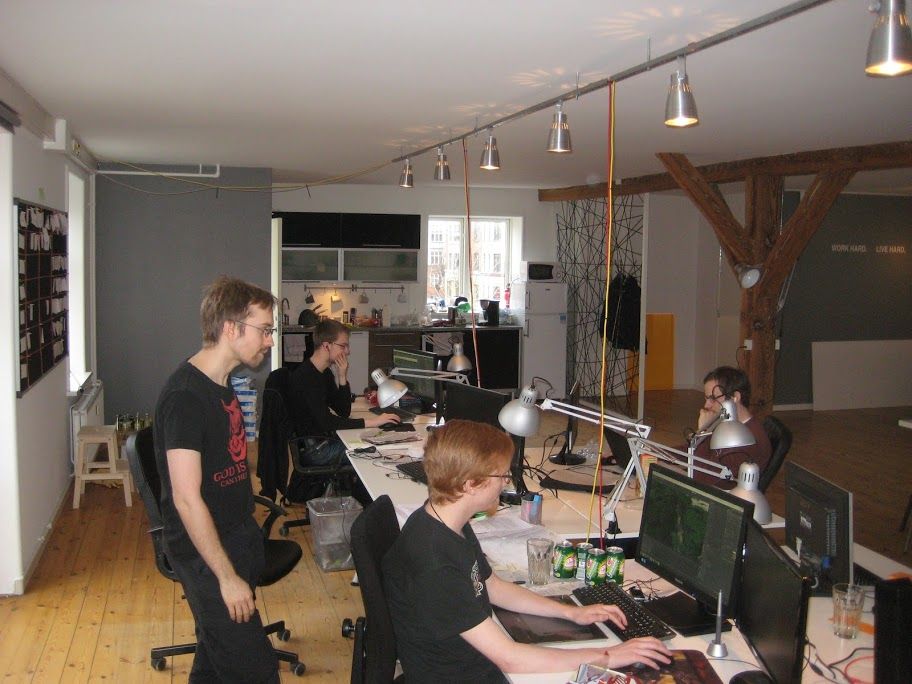
Conquistador started as a small university project that Wæver did. Eskildsen came on later, and they decided to turn the project into a game for mobile phones. Eskildsen smiles and recalls that “it didn't sell so well, but it got some pretty good reviews!” On the question of how this simpler game became the full-fledged PC RPG that Conquistador is today, Wæver comments: “We wanted to make a PC game, but we had no money, we had this office that we just rented because working from home sucks, so we really needed to get something out quickly. We turned the project into a game for mobile phones, but all this time we had these ideas of the game we really wanted to make. When the game came out for phones, we looked at it and just went “fuck it, let's try to get the funding we need to make the game we really want to make.”” Thus, Conquistador went to Kickstarter. It is evident from our conversation that both Wæver and Eskildsen have an extensive background in gaming and modding. In fact, Wæver is the main architect behind the much-praised Deus Ex mod “The Nameless Mod” which, besides a weird setting (only fully understood by the people on the forum to which the mod was dedicated), has very interesting gameplay, level design and quest solution.
Kickstarting Expeditions: Conquistador
An obvious question which has been put forward to many developers behind kickstarted oldschool games, is how they connect with or even find their target audience. Surprisingly, Wæver states that this was, in fact, incredibly easy. While managing the Kickstarter was a lot of hard work, RPG fans and adventure game fans are actually very large audiences on Kickstarter. Ironically, whereas the Codex has long lamented its interests' position in the backseat of modern game development, it seems we are one of the core audiences of the new titles being announced funded through Kickstarter, and a fairly large audience at that. Wæver mentions RPG Watch, RockPaperShotgun and RPG Codex as the epicenters of the interest in Conquistador.
The developers of the roguelike 'Faster Than Light' commented after the game's release that the huge amount of attention that was given to their small team added another layer of stress to their work. When asked if the same held true for Conquistador, Wæver and Eskildsen shake their heads. “It was more a case of being stressed trying to get attention.” When prodded as to what they meant by this, they explain that it was a 24-hour job; going to forums, writing comments, writing e-mails, making sure that the game got the attention it needed to meet the goal. Eskildsen elaborates that “the Kickstarter was immensely stressful, mostly because we had no idea if we were going to get funded in the end.” While discussing the horror stories of Kickstarter – games that didn't meet even half of their intended goal, or games that met their goal but ran out of money because they had to spend so much on player rewards and physical items – Wæver leans forward in the couch: “It's a lot of hard work and research, that's what it comes down to. Our Project Manager Ali spent a lot of time just reading. Studying post-mortem Kickstarters. He presented the information to us, and we did the math. We decided not to send out physical rewards until the 100 dollar mark, because otherwise we'd simply be losing money. So we took a lot of care, because we had heard all these horror-stories, in designing our reward-tiers. We benefited from the experience of other people.” When asked about the future of Kickstarter, Eskildsen looks up at the ceiling, pondering: “I really hope that it will become a viable way to fund games from start to finish. Sometimes though, it feels a bit like a popularity contest. You have all these huge names getting a lot of cash, and then you have us, working our asses off for three months and barely getting across the finish line.” They both stress that they believe in Kickstarter though, and see it as a way to fund games that plenty of people want to see made, but which do not warrant multi-million dollar projects. Eskildsen elaborates: “It just seems like, in the beginning there were all these big names like Fargo and Schafer coming out and making a lot of money. Then they were followed by a bunch of other big names who just sorta... failed.” “You mean like Shaker and Thorvalla?” I ask, a question that is met with nods and laughter. “Thorvalla, yeah” Eskildsen comments dryly, with a tone of awkwardness on behalf of this particular Kickstarter in his voice. The importance of researching Kickstarter as a phenomenon and learning why previously Kickstarted games were successful or unsuccessful before launching your own Kickstarter immediately sprang to my mind when discussing these failed “big Kickstarters.” The key to succesfully funding experimental games on Kickstarter, Wæver and Eskildsen seem to agree, is a foundation that players know and love, with experimentation built on top of that.
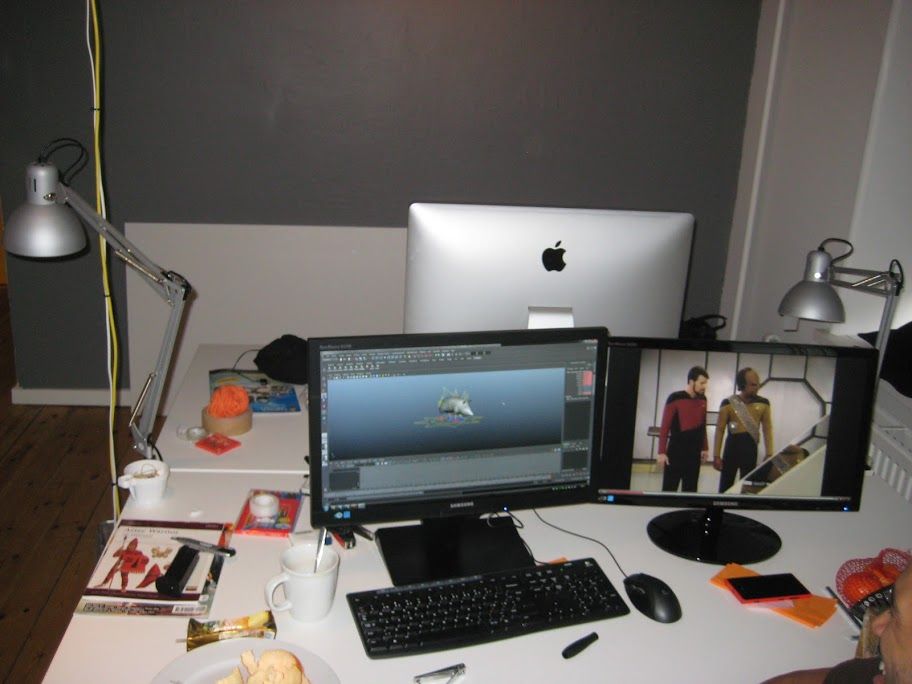
Animator toying around and causing the somewhat hilarious side-effect of making the animated pig model dance
Choose Your Own Conquistador
One of the things that really stands out in Conquistador is the incredible richness of the setting and the depth of the Choose Your Own Adventure elements. When asked about these, Wæver, who is responsible for most of the writing in the game, comments that “We started out using CYOA due mainly to design-constraints. We don't have the resources to churn out animations and character models and stuff like that at a fast pace. Text is easy and simple to produce.” When faced with the notion that Conquistador is probably better written than most mainstream titles, Wæver laughs and comments that it seems like dubious praise considering the general quality of writing in mainstream video games. “That's not the whole story though, either," he moves on: "There is also the fact that we enjoy branching narratives and vivid text descriptions, rather than just showing everything on a linear path through cut-scenes.”

The setting is another thing entirely. When asked why the setting seems to play such a huge role in the game, Wæver states that “I guess we all have this very narrative focused game design approach. It's very much about narrative consistency in everything we make. So all of the art has to fit with everything we make, and all of the level-design needs to make sense and stuff like that. It's not necessarily about realism, but more about authenticity in everything we've selected. So whenever we do anything, whenever we make a decision, we think about it in terms of “how well does this serve the setting and the narrative that we have?”” Eskildsen continues: “It's also because of the vast richness of the setting itself. It lends itself well to a game, when you study the setting, all sorts of ideas for gameplay come up.” Wæver adds that “probably 90% of RPGs are either Fantasy or Science Fiction” to which Eskildsen nods and says “it's both easier to stand out and make something new in a setting like this.” They both conclude that “it's actually fairly easy, you know. We just look in the history books and pick out these concepts. And you read these crazy stories about what went on back then. Yeah, it's fucking ridicoulous the things that happened. You think “no, there's no way this ever happened”, it's just insane. Reality surpasses fantasy.”
Critical discussion on the topic of gameplay
The combat in the preview build of Conquistador that we got our hands on felt very basic at some points, and it seemed the optimal strategy was often to focus on bringing down single enemies, going from enemy to enemy. When faced with this opinion, Wæver ponders for a spell, and then says: “I think the tactical challenge in our combat doesn't necessarily come from the system itself. The actual battlefield is hugely important in terms of what you can and cannot do. We really focused on getting a lot of different layouts in and also different configurations. Sometimes you're flanked when combat begins, sometimes you're only attacked from one side, sometimes you're surrounded, or your dudes are spread out.” Eskildsen adds: “yeah, or you have to reach a certain part of the map.” “Yeah,” Wæver continues, “we also have different victory conditions. All this requires different tactics, obviously. I think that we just focused on having a flexible combat system more than having a super-complex one. So that you will have to kind of analyze the tactical situation more than the system. There are a fair few battlefields where if you just kind of play them on autopilot – simply advance and try to take the enemy out – you will get creamed, because a lot of the time there's more of them than of you. So a lot of the time you have to think “hmm, how do I get these guys to where I want them, how to get them in a position where I can flank them?”” Wæver and Eskildsen add that the preview build contains only 15 battles out of the full game's 75, that these are among the first battles the team actually designed (and therefore have simple, flat terrain for example), and that these battles are at the beginning of the game and are therefore easier than what you can expect in the game's later stages.
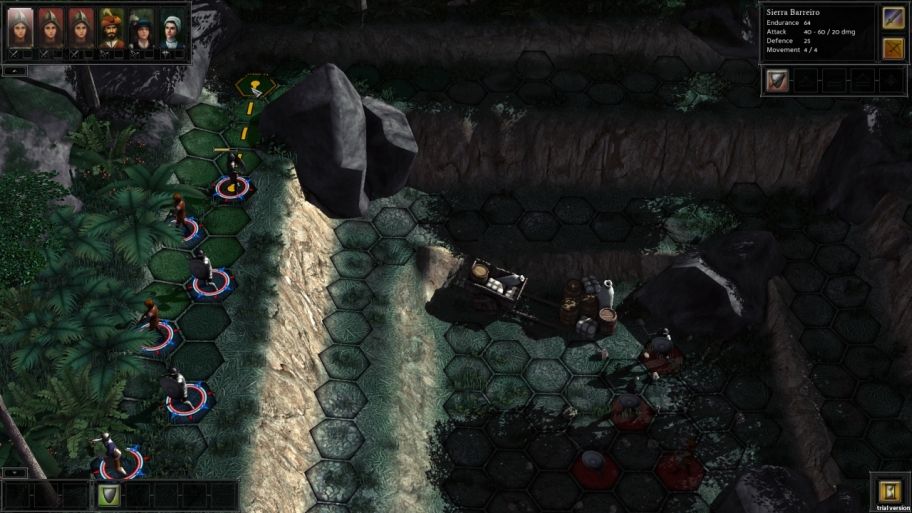
When it comes to the rest system, which allows you to manage which of your followers you put on guard duty, hunting duty, healing duty and so on, the Codex staff felt it was a lot of busywork for rewards that weren't great, and some ended up simply auto-assigning companions to their duties. Wæver looks up in surprise. “Well, actually, most of our preview testers who used auto-assign simply got wrecked. As you pick up more people, the demands of the camping system grows steeper. If you use auto-assign you will never be crafting or researching. You will never be doing herbalism or preserving. You always only do the three basic tasks. Especially if you are in the mountains or swamps in Mexico, those have very little to hunt, which makes preserving much more important. You will gain very little medicine if you don't use herbalism, because then you will only get the medicine that you buy. And then of course, once you get injured, you'll have to think about who you heal first. Especially if you don't have that many doctors or your doctor is among the injured. In the end though, this is not a strategy-game. The camping system is meant to add some choice to the exploration, not be a main part of the game.”
Wæver goes on to talk a bit about the way different difficulty settings work in the game. For example, besides the usual Easy/Normal/Hard difficulty settings, Conquistador also has a set of sliders. One of them controls enemy intelligence. It determines whether enemies focus their fire on vulnerable followers, and how many tactical mistakes they make - such as provoking attacks of opportunity. There seems to be a good variety of settings here. For example, normally in Conquistador, followers that go down in battle are rendered unconscious, and their injuries or death are resolved only after combat has concluded, at which point you will have a chance to use your doctors to help alleviate the pain and injuries of your followers. An option in the difficulty settings, however, allows your followers to die directly on the battlefield if they've been down for extended periods of time. Conquistador also features an Ironman mode where you are restricted to a limit number of saves, and the game automatically saves after each event and each time you make camp.
In the preview build, there is five different classes of followers, while the Kickstarter page promised ten. Wæver comments that there are actually eleven classes in the game now – five Spanish, and six native. You will have a chance to pick up these native followers in Mexico, one of the game's locations, and these guys will have different abilities and use other weapons than their Spanish counterparts. One of the main criticisms expressed by the Codex' previewers was the emptiness of the overland map in Conquistador. Eskildsen quickly jumps in as I point that out: “That's actually one of the things that we massively overhauled since the preview build. Much more level-design has gone into those now. You'll find all these nooks and crannies all over the world now. So there's like a little nook with a treasure chest for example, some with medicine, things like that.” Wæver adds that “there's not technically more content, in terms of unique text and events, but it feels a lot more dense now. We already have a good amount of text and events, the problem was more that the overland map was just a vast open space where you traveled between events. That's been changed. Vince [of Iron Tower, developer of Age of Decadence, ed.] actually commented that he wanted more wandering enemies. We had 10 or 11 wandering enemies in Mexico, but we had only one in Hispaniola. We added 3 immeadietely after reading Vince's Let's Play.” Wæver laughs: “We were like “god dammit! We have to do that!”, so we wrote 3 quick events and put those in, so I guess there actually is more content, in terms of battles.”
Finally, I ask Wæver and Eskildsen whether they are ready for the release the 28th. Wæver lets out a big sigh. “Yeah, I mean we're going gold on monday. But man, we're stressed right now. We will make it, but we will most likely add some post-release content.” To this, Eskildsen adds: “For free, obviously.”
As we finish up and I prepare to leave the offices of Logic Artists, Wæver stands up from the couch: "You know, it's funny. Most sites that interview us are mainly interested in all sorts of stuff about our company and Kickstarter and the basics of what the game is about. You guys always ask these these really technical questions about gameplay," he laughs.
After that, Eskildsen shadily pulls me aside and offers me the studio's compliments for bringing attention to their game.

Grunker happily recieves the agreed upon bribe for a job of True Gaming Journalism well done
Expeditions: Conquistador will be released this Thursday. As the guys from Logic Artists have been kind enough to burden our stressed staff with a review copy, you can expect a Codex Review to follow shortly thereafter.
Links:
Logic Artists website: http://www.logicartists.com/
Expeditions: Conquistador Kickstarter page : http://www.kickstarter.com/projects/2128128298/expeditions-conquistador
Logic Artists Facebook page: http://www.facebook.com/logicartists?fref=ts
2013 is looking to be an interesting year, largely because of events that took place in 2012, a year otherwise so uninteresting that finding actual RPGs to discuss was difficult. A year so bland for cRPGs that GameBanshee decided to give its GOTY awards to games like Kingdoms of Amalur and Darksiders II. Yet in the middle of this RPG desert, the Kickstarter phenomenon kicked off in force, and brought us a slew of new games to look forward to. Oddly, it wasn't just Kickstarter that seemed promising – other games catering to the tastes of the Codex were announced separately as well. A game like Chaos Chronicles, promising a blend of Temple of Elemental Evil, Realms of Arkania and Phantasie was suddenly in the mix, with no Kickstarter-backing or anything of that sort, save a few euros from the German state. As such, whether you feel optimistic about the Kickstarter-phenomenon or not, and whether you personally look forward to the games that are a-coming, one thing certainly seems irrefutable: In 2013, the Codex will finally have games to discuss again.
One of the oldschool RPGs funded by Kickstarter is the difficult to define Expeditions: Conquistador, which is coming out soon (February 28th, in fact)*, and as such looks like it will be delivered on the schedule promised by the developers during the Kickstarter. One of the few Kickstarted games, it seems, to meet its deadline. As one of the first Kickstarted RPGs to actually be released it is of obvious interest to the Codex, and since their studio is located a manageable 20 minutes on foot from my apartment, I decided to pay Logic Artists, the developers of Conquistador, a visit.
*EDIT: Since the release of this article, Logic Artists have post-poned the release date of Expeditions: Conquistador due to distribution-issues. See more here. Ah, Thursdays and their RPG releases.

That Conquistador is hard to define is evident the moment you fire up the preview build the guys at Logic Artists were kind enough to offer to us. In my opinion, it can best be described as an odd mix of King's Bounty with more RPG mechanics and a Choose Your Own Adventure game. It is, perhaps, in some way, comparable to Legends of Eisenwald, another kickstarted RPG, though Eisenwald focuses more on strategy elements. Conversely, when I spoke to Lead Designer Jonas Wæver, he said the game's combat was inspired by Fallout and Dungeons & Dragons, while the narrative was inspired by games like Baldur's Gate and Planescape: Torment – though he was reluctant to compare the quality of the writing directly to Torment, a game that was obviously held in high esteem at the offices of Logic Artists. Daniel Eskildsen, Conquistador's Graphics Designer, comments that what really sets Conquistador's battles apart from Kings Bounty or Heroes of Might & Magic is the fact that each battleground is uniquely crafted for the encounter, and Wæver adds that these maps also come with elevation and are focused on things like positioning and line-of-sight. For more on the technical basics of the game and its mechanics, Codex staff member Zed's preview of the game is worth a read. One thing remains certain, however: Expeditions: Conquistador is a beast entirely of its own kind.

Logic Artists is a studio originally formed by friends from the Game Design and Programmer program on ITU, the Danish IT university. When I arrived at their location, 8 people were sitting behind big monitors, joking and typing away at their keyboards. On a wall behind me, Logic Artist's slogan of “Work hard. Live hard. Play hard.” faced the room of designers and programmers, constantly reminding them of the company's aims. Though Wæver later mentioned that they “know it's kind of pretentious”, the “play hard” part certainly seems like a worthy reminder for an oldschool game-developer, in a world where taking cover behind chest-high walls in third person is the predominant form of video game entertainment.

The offices of Logic Artists, Jonas Wæver (left) and Daniel Eskildsen (right) in the foreground of the picture
Conquistador started as a small university project that Wæver did. Eskildsen came on later, and they decided to turn the project into a game for mobile phones. Eskildsen smiles and recalls that “it didn't sell so well, but it got some pretty good reviews!” On the question of how this simpler game became the full-fledged PC RPG that Conquistador is today, Wæver comments: “We wanted to make a PC game, but we had no money, we had this office that we just rented because working from home sucks, so we really needed to get something out quickly. We turned the project into a game for mobile phones, but all this time we had these ideas of the game we really wanted to make. When the game came out for phones, we looked at it and just went “fuck it, let's try to get the funding we need to make the game we really want to make.”” Thus, Conquistador went to Kickstarter. It is evident from our conversation that both Wæver and Eskildsen have an extensive background in gaming and modding. In fact, Wæver is the main architect behind the much-praised Deus Ex mod “The Nameless Mod” which, besides a weird setting (only fully understood by the people on the forum to which the mod was dedicated), has very interesting gameplay, level design and quest solution.
Kickstarting Expeditions: Conquistador
An obvious question which has been put forward to many developers behind kickstarted oldschool games, is how they connect with or even find their target audience. Surprisingly, Wæver states that this was, in fact, incredibly easy. While managing the Kickstarter was a lot of hard work, RPG fans and adventure game fans are actually very large audiences on Kickstarter. Ironically, whereas the Codex has long lamented its interests' position in the backseat of modern game development, it seems we are one of the core audiences of the new titles being announced funded through Kickstarter, and a fairly large audience at that. Wæver mentions RPG Watch, RockPaperShotgun and RPG Codex as the epicenters of the interest in Conquistador.
The developers of the roguelike 'Faster Than Light' commented after the game's release that the huge amount of attention that was given to their small team added another layer of stress to their work. When asked if the same held true for Conquistador, Wæver and Eskildsen shake their heads. “It was more a case of being stressed trying to get attention.” When prodded as to what they meant by this, they explain that it was a 24-hour job; going to forums, writing comments, writing e-mails, making sure that the game got the attention it needed to meet the goal. Eskildsen elaborates that “the Kickstarter was immensely stressful, mostly because we had no idea if we were going to get funded in the end.” While discussing the horror stories of Kickstarter – games that didn't meet even half of their intended goal, or games that met their goal but ran out of money because they had to spend so much on player rewards and physical items – Wæver leans forward in the couch: “It's a lot of hard work and research, that's what it comes down to. Our Project Manager Ali spent a lot of time just reading. Studying post-mortem Kickstarters. He presented the information to us, and we did the math. We decided not to send out physical rewards until the 100 dollar mark, because otherwise we'd simply be losing money. So we took a lot of care, because we had heard all these horror-stories, in designing our reward-tiers. We benefited from the experience of other people.” When asked about the future of Kickstarter, Eskildsen looks up at the ceiling, pondering: “I really hope that it will become a viable way to fund games from start to finish. Sometimes though, it feels a bit like a popularity contest. You have all these huge names getting a lot of cash, and then you have us, working our asses off for three months and barely getting across the finish line.” They both stress that they believe in Kickstarter though, and see it as a way to fund games that plenty of people want to see made, but which do not warrant multi-million dollar projects. Eskildsen elaborates: “It just seems like, in the beginning there were all these big names like Fargo and Schafer coming out and making a lot of money. Then they were followed by a bunch of other big names who just sorta... failed.” “You mean like Shaker and Thorvalla?” I ask, a question that is met with nods and laughter. “Thorvalla, yeah” Eskildsen comments dryly, with a tone of awkwardness on behalf of this particular Kickstarter in his voice. The importance of researching Kickstarter as a phenomenon and learning why previously Kickstarted games were successful or unsuccessful before launching your own Kickstarter immediately sprang to my mind when discussing these failed “big Kickstarters.” The key to succesfully funding experimental games on Kickstarter, Wæver and Eskildsen seem to agree, is a foundation that players know and love, with experimentation built on top of that.

Animator toying around and causing the somewhat hilarious side-effect of making the animated pig model dance
Choose Your Own Conquistador
One of the things that really stands out in Conquistador is the incredible richness of the setting and the depth of the Choose Your Own Adventure elements. When asked about these, Wæver, who is responsible for most of the writing in the game, comments that “We started out using CYOA due mainly to design-constraints. We don't have the resources to churn out animations and character models and stuff like that at a fast pace. Text is easy and simple to produce.” When faced with the notion that Conquistador is probably better written than most mainstream titles, Wæver laughs and comments that it seems like dubious praise considering the general quality of writing in mainstream video games. “That's not the whole story though, either," he moves on: "There is also the fact that we enjoy branching narratives and vivid text descriptions, rather than just showing everything on a linear path through cut-scenes.”

The setting is another thing entirely. When asked why the setting seems to play such a huge role in the game, Wæver states that “I guess we all have this very narrative focused game design approach. It's very much about narrative consistency in everything we make. So all of the art has to fit with everything we make, and all of the level-design needs to make sense and stuff like that. It's not necessarily about realism, but more about authenticity in everything we've selected. So whenever we do anything, whenever we make a decision, we think about it in terms of “how well does this serve the setting and the narrative that we have?”” Eskildsen continues: “It's also because of the vast richness of the setting itself. It lends itself well to a game, when you study the setting, all sorts of ideas for gameplay come up.” Wæver adds that “probably 90% of RPGs are either Fantasy or Science Fiction” to which Eskildsen nods and says “it's both easier to stand out and make something new in a setting like this.” They both conclude that “it's actually fairly easy, you know. We just look in the history books and pick out these concepts. And you read these crazy stories about what went on back then. Yeah, it's fucking ridicoulous the things that happened. You think “no, there's no way this ever happened”, it's just insane. Reality surpasses fantasy.”
Critical discussion on the topic of gameplay
The combat in the preview build of Conquistador that we got our hands on felt very basic at some points, and it seemed the optimal strategy was often to focus on bringing down single enemies, going from enemy to enemy. When faced with this opinion, Wæver ponders for a spell, and then says: “I think the tactical challenge in our combat doesn't necessarily come from the system itself. The actual battlefield is hugely important in terms of what you can and cannot do. We really focused on getting a lot of different layouts in and also different configurations. Sometimes you're flanked when combat begins, sometimes you're only attacked from one side, sometimes you're surrounded, or your dudes are spread out.” Eskildsen adds: “yeah, or you have to reach a certain part of the map.” “Yeah,” Wæver continues, “we also have different victory conditions. All this requires different tactics, obviously. I think that we just focused on having a flexible combat system more than having a super-complex one. So that you will have to kind of analyze the tactical situation more than the system. There are a fair few battlefields where if you just kind of play them on autopilot – simply advance and try to take the enemy out – you will get creamed, because a lot of the time there's more of them than of you. So a lot of the time you have to think “hmm, how do I get these guys to where I want them, how to get them in a position where I can flank them?”” Wæver and Eskildsen add that the preview build contains only 15 battles out of the full game's 75, that these are among the first battles the team actually designed (and therefore have simple, flat terrain for example), and that these battles are at the beginning of the game and are therefore easier than what you can expect in the game's later stages.

When it comes to the rest system, which allows you to manage which of your followers you put on guard duty, hunting duty, healing duty and so on, the Codex staff felt it was a lot of busywork for rewards that weren't great, and some ended up simply auto-assigning companions to their duties. Wæver looks up in surprise. “Well, actually, most of our preview testers who used auto-assign simply got wrecked. As you pick up more people, the demands of the camping system grows steeper. If you use auto-assign you will never be crafting or researching. You will never be doing herbalism or preserving. You always only do the three basic tasks. Especially if you are in the mountains or swamps in Mexico, those have very little to hunt, which makes preserving much more important. You will gain very little medicine if you don't use herbalism, because then you will only get the medicine that you buy. And then of course, once you get injured, you'll have to think about who you heal first. Especially if you don't have that many doctors or your doctor is among the injured. In the end though, this is not a strategy-game. The camping system is meant to add some choice to the exploration, not be a main part of the game.”
Wæver goes on to talk a bit about the way different difficulty settings work in the game. For example, besides the usual Easy/Normal/Hard difficulty settings, Conquistador also has a set of sliders. One of them controls enemy intelligence. It determines whether enemies focus their fire on vulnerable followers, and how many tactical mistakes they make - such as provoking attacks of opportunity. There seems to be a good variety of settings here. For example, normally in Conquistador, followers that go down in battle are rendered unconscious, and their injuries or death are resolved only after combat has concluded, at which point you will have a chance to use your doctors to help alleviate the pain and injuries of your followers. An option in the difficulty settings, however, allows your followers to die directly on the battlefield if they've been down for extended periods of time. Conquistador also features an Ironman mode where you are restricted to a limit number of saves, and the game automatically saves after each event and each time you make camp.
In the preview build, there is five different classes of followers, while the Kickstarter page promised ten. Wæver comments that there are actually eleven classes in the game now – five Spanish, and six native. You will have a chance to pick up these native followers in Mexico, one of the game's locations, and these guys will have different abilities and use other weapons than their Spanish counterparts. One of the main criticisms expressed by the Codex' previewers was the emptiness of the overland map in Conquistador. Eskildsen quickly jumps in as I point that out: “That's actually one of the things that we massively overhauled since the preview build. Much more level-design has gone into those now. You'll find all these nooks and crannies all over the world now. So there's like a little nook with a treasure chest for example, some with medicine, things like that.” Wæver adds that “there's not technically more content, in terms of unique text and events, but it feels a lot more dense now. We already have a good amount of text and events, the problem was more that the overland map was just a vast open space where you traveled between events. That's been changed. Vince [of Iron Tower, developer of Age of Decadence, ed.] actually commented that he wanted more wandering enemies. We had 10 or 11 wandering enemies in Mexico, but we had only one in Hispaniola. We added 3 immeadietely after reading Vince's Let's Play.” Wæver laughs: “We were like “god dammit! We have to do that!”, so we wrote 3 quick events and put those in, so I guess there actually is more content, in terms of battles.”
Finally, I ask Wæver and Eskildsen whether they are ready for the release the 28th. Wæver lets out a big sigh. “Yeah, I mean we're going gold on monday. But man, we're stressed right now. We will make it, but we will most likely add some post-release content.” To this, Eskildsen adds: “For free, obviously.”
As we finish up and I prepare to leave the offices of Logic Artists, Wæver stands up from the couch: "You know, it's funny. Most sites that interview us are mainly interested in all sorts of stuff about our company and Kickstarter and the basics of what the game is about. You guys always ask these these really technical questions about gameplay," he laughs.
After that, Eskildsen shadily pulls me aside and offers me the studio's compliments for bringing attention to their game.

Grunker happily recieves the agreed upon bribe for a job of True Gaming Journalism well done
Expeditions: Conquistador will be released this Thursday. As the guys from Logic Artists have been kind enough to burden our stressed staff with a review copy, you can expect a Codex Review to follow shortly thereafter.
Links:
Logic Artists website: http://www.logicartists.com/
Expeditions: Conquistador Kickstarter page : http://www.kickstarter.com/projects/2128128298/expeditions-conquistador
Logic Artists Facebook page: http://www.facebook.com/logicartists?fref=ts
There are 654 comments on RPG Codex Report: Expeditions: Conquistador, Logic Artists and Kickstarter











